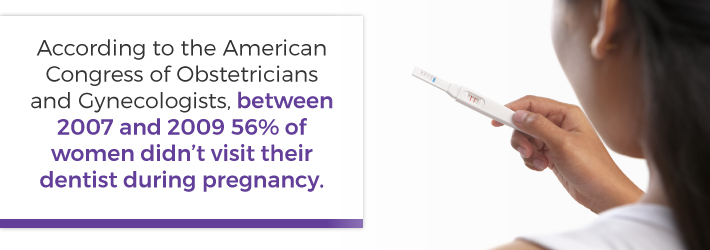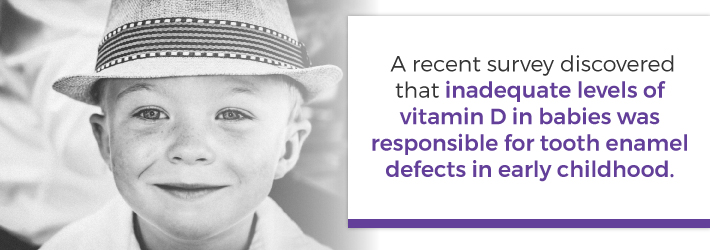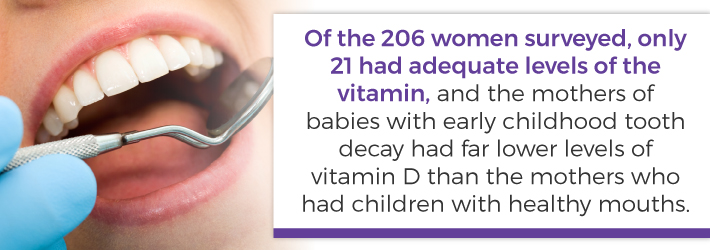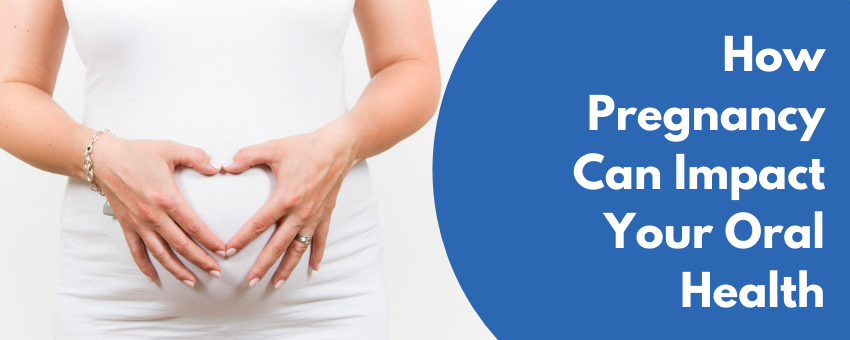
Pregnancy is a time of change for almost every aspect of your body. There are all the expected changes, such as a growing abdomen, however, have you ever stopped to think about how pregnancy impacts your oral health?
During pregnancy, it’s important that you pay extra close attention to your oral health, in addition to your overall health. Besides being more susceptible to periodontal disease while pregnant, any pre-existing periodontal disease can become more severe when you’re expecting. Pregnancy and oral health go together hand-in-hand, and getting oral disease under control is an important aspect of both your health and that of your baby’s.
According to the American Congress of Obstetricians and Gynecologists, between 2007 and 2009, 56% of women didn’t visit their dentist during pregnancy. This figure needs to change for the better, because poor dental health can negatively affect both you and your baby.
In this guide, we look at how pregnancy impacts your oral health and your baby’s, as well as present tips on how you can maintain good oral health throughout your pregnancy and how your dentist can play an integral role in helping you with that.
Table of Contents
Pregnancy and Your Baby’s Health
First, to fully understand the need to take care of your oral health while you’re pregnant, it’s important to know the impact that poor dental care can have not only on yourself, but also on your child.
Research suggests that poor oral health in pregnant women, particularly those having gingivitis, can lead to a number of complications in their babies, such as:
- Low-birthweight babies
- Preterm deliveries
It’s believed that bacteria derived from gingivitis travels to the uterus and triggers the production of prostaglandins, a chemical that is suspected to induce premature labor.
A Note on Vitamin D
Vitamin D is essential for regulating both phosphorus and calcium levels in your blood. Researchers found a correlation between a pregnant woman’s vitamin D intake and the dental health of her child. A survey of 206 women in their second trimesters of pregnancy carried out by researchers from the University of Manitoba in Canada discovered that inadequate levels of vitamin D in babies was responsible for tooth enamel defects in early childhood.
Of the 206 women surveyed, only 21 had adequate levels of the vitamin, and the mothers of babies with early childhood tooth decay had far lower levels of vitamin D than the mothers who had children with healthy mouths.
It’s thought that the vitamin D levels related to prenatal vitamin intake, as well as the frequency of milk consumption. To ensure that your baby’s oral health gets off to the best start possible, remember to increase your intake of vitamin D. You might not get adequate vitamin D amounts from the foods you eat, so speak with your doctor about taking a supplement. Furthermore, one of the easiest and most natural ways to get vitamin D is by safely exposing your skin to the sunlight.
Pregnancy Changes and Your Oral Health
Many women experience their nine months of pregnancy with no dental discomfort. However, being pregnant can make some of your oral conditions worse, and can also cause new dental issues to arise. There are a number of conditions that worsen or surface during pregnancy. These include:
- Tooth Decay — If you experience morning sickness and vomit frequently while pregnant, the increased acid from vomiting can eat away at the enamel of your teeth. What’s more, if you’re experiencing cravings for sugar-laden or carbohydrate-heavy foods — as many pregnant women do, it can also cause your teeth to decay more rapidly than usual. Under these circumstances, it’s paramount that you remember to brush twice a day, as well as floss too.
- Pregnancy Gingivitis — When you’re pregnant, your mouth can be adversely affected due to hormonal changes. You may develop what’s known as “pregnancy gingivitis.” whereby your gums swell and become tender. Your body is supporting two people right now, so the resulting increased blood flow can make your gums swollen and tender to the touch. With this condition, you might also notice some blood whenever you brush your teeth. When it’s left untreated, pregnancy gingivitis can lead to more serious gum disease. Therefore, it’s imperative that you speak to your dentist if you believe you are experiencing pregnancy gingivitis.
- Periodontitis — If gingivitis in pregnancy is left untreated, you can end up with periodontitis. This condition results in layers of plaque on your teeth that release toxins that can create pockets of infection in your bones and gums. This can cause your teeth to become loose, as well as bone loss.
- Pregnancy Tumors — Some pregnant women will occasionally experience an overgrowth of gum tissue known as pregnancy tumors. Most commonly occurring during the second trimester, these often are located between the teeth, and are raw-looking and red. These swellings tend to bleed easily, and although they often disappear after you give birth, if you’re worried about them, speak with your dentist about their removal.
- Loose Teeth — When you’re pregnant, the bone and ligaments that support your teeth can become looser. Fortunately, you usually won’t lose any teeth unless you have an underlying issue.
- Tooth Sensitivity — Hormonal changes within your body are responsible for increased tooth sensitivity you may experience while you’re pregnant. You may find that you have problems with sensitivity when you’re eating hot or cold foods, for example.
- Dry Mouth — One incredibly uncomfortable symptom of pregnancy tends to be dry mouth. Although it’s probably one of the less commonly spoken about issues, it’s a real problem, and often correlates with nausea. Dry mouth is very important to tackle, as when you don’t have enough saliva to flush away debris and to control the bacterial population of your mouth, your gums and teeth can suffer. You might also see more plaque buildup, as well as cavities.
- Excessive Saliva — On the opposite spectrum of dry mouth, less commonly, pregnant women feel they have too much saliva in their mouths. This condition occurs very early in a pregnancy. It typically disappears by the end of the first trimester, and it may occur along with nausea.
- Other Impacts — Other problems that are often found in pregnant women who have poor oral care during pregnancy are intrauterine growth restriction, premature delivery, preeclampsia and gestational diabetes.
These potential conditions that you can develop during pregnancy represent all the more reason why visiting your dentist regularly before planning a pregnancy and during your pregnancy is essential.
Before You Get Pregnant
One of the most overlooked recommendations for women who are planning to become pregnant is to see their dentist for a checkup. If you’re planning to have a baby, schedule an appointment with your dentist in advance. Get your teeth cleaned professionally, and see if there are any other issues that need taking care of before conceiving.
If you’re practicing good oral hygiene before you get pregnant, you’re giving you and your child the best start possible, the pregnancy impact on your teeth should be minimal.
While You Are Pregnant: Working with Your Dentist
One of the most common questions expecting moms what to know is what type of dental work is safe to undergo during pregnancy. As a mom-to-be, you should continue to have regular dental exams and cleanings. This is not only advised, but also recommended, to prevent a gum infection that could potentially lead to preterm labor.
You should postpone any elective or unnecessary dental treatments until after the birth of the baby. Cosmetic treatments, such as professional teeth whitening, are best left to wait until the baby is born as well.
To prevent the spread of infection to your body or to your developing baby, you should take care of any necessary and emergency dental treatment, such as a root canal or tooth extraction as soon as your dentist recommends.
In the case of other dental work, such as a installing a crown or getting a cavity filled, it’s often advised to limit these types of procedures to the second trimester. While it’s generally okay to have these procedures done during the third trimester, it might be uncomfortable to lie down in the dental chair during an extended period.
General Rules:
- See you dentist before planning to get pregnant.
- Maintain regular dental exams and cleanings.
- Postpone elective procedures, such as professional teeth whitening, until after delivery.
- Avoid having certain non-infection related dental procedures, if possible, during the first trimester and during the latter half of the third trimester.
- See your dentist regarding any dental infections or tooth abscess treated right away.
When Should I Tell My Dentist That I’m Pregnant?
You should let your dentist know right away if there’s any possibility you’re pregnant. When you find out how many weeks pregnant you are, it’s essential to let the dental office know the details. Your dentist also needs to know the following:
- Any medications, including prenatal vitamins, you’re taking.
- Any special advice your family physician or obstetrician has given you.
- Whether your pregnancy is high-risk.
- Any medical conditions you may have.
It’s imperative that you tell your dentist if you might be pregnant so that they can determine what they can and cannot prescribe for you. If you’re in doubt about any medications or prenatal vitamins you’re currently taking, speak to your doctor or dentist to set your mind at rest.
Can I Have Local Anesthetic If I’m Pregnant?
If you’re pregnant and need to have a tooth pulled, get a root canal or have a filling placed, the local anesthetic that your dentist may prescribe is safe, both for you and for your unborn baby.
This is backed up by a recent study in the Journal of the American Dental Association that showed that there was no difference in baby weight, prematurity, rate of miscarriage and birth defects between expectant moms who underwent anesthetic procedures and those who didn’t.
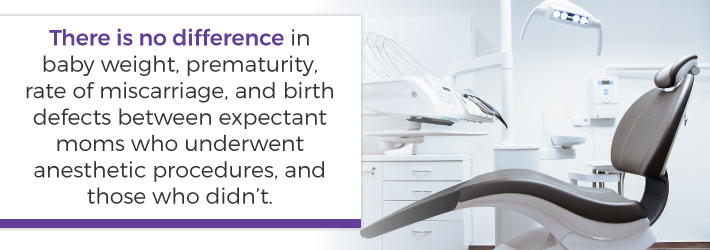
Can I Get Dental X-Rays?
Further findings from the above study showed that X-rays are entirely safe for pregnant women. Although there is a very low amount of radiation from a dental X-ray, your dentist will cover both your abdomen and the thyroid area of your throat with a leaded apron to ensure the procedure is as safe as possible.
During Pregnancy: Handling Oral Health Issues & Tips to Maintain Good Oral Health
While pregnant, as mentioned above, you might develop certain conditions, such as dry mouth, teeth sensitivity, morning sickness and others that might impact your oral health. Below are some ways to cope and effectively handle these issues.
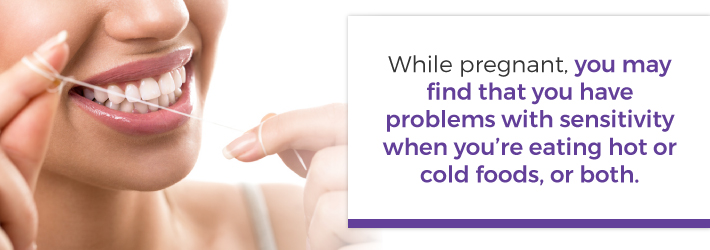 Oral Hygiene and Coping with Morning Sickness
Oral Hygiene and Coping with Morning Sickness
Pregnancy can be a wonderful time. However, it can often be coupled with morning sickness in the form of nausea, vomiting and heartburn, with the nausea and vomiting particularly occurring during the first trimester and heartburn during the last.
Now, your first instinct might to immediately brush your teeth after vomiting. However, from an oral health perspective, this is actually discouraged. If you brush your teeth immediately after vomiting, the acid from the vomit can be particularly harmful to your tooth enamel.
Instead of brushing your teeth right away, rinse your mouth with water, and then rinse with a fluoride mouthwash. Alternatively, you could use a use a bicarbonate of soda rinse to neutralize the acid. Wait about an hour after rinsing your mouth, then brush your teeth.
If you’re having trouble with brushing your teeth due to your normal toothpaste making you nauseous during pregnancy, change your usual toothpaste for a blander-tasting one. Your hygienist or dentist will be able to help with recommendations.
Other tips for coping with morning sickness include:
- Eat small amounts often.
- Suck on ice cubes.
Morning sickness is sometimes an inescapable symptom of pregnancy. If you’re suffering badly from the condition, speak to a medical professional for help.
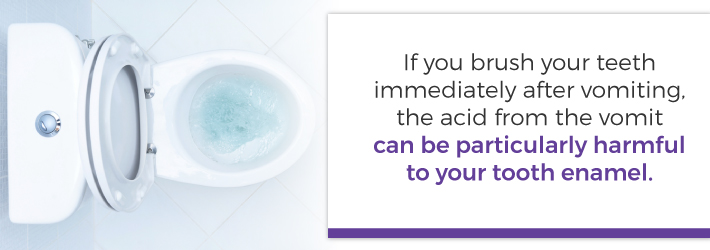 How Can I Best Relieve My Dry Mouth?
How Can I Best Relieve My Dry Mouth?
We’ve talked above about the reasons your mouth might be dry during pregnancy, now you need to know how to remedy it. Perhaps the easiest and most obvious way to relieve your dry mouth is to up your intake of fluids. Get into the habit of:
- Drinking lots of water to stay hydrated.
- Carrying a water bottle with you everywhere you go.
- Buying some sugarless gum or candies that will stimulate your saliva flow when sucked on.
- Making plenty of ice chips that you can suck on both to stay hydrated and to relieve nausea.
- Sleeping with a humidifier on if you awake in the morning with a feeling of dryness in your mouth.
- Speaking with your dentist about other options if your dry mouth still won’t go away, or at least vastly improve after following these steps.
How to Look After Sensitive Pregnancy Gums
If you’re experiencing tooth sensitivity while pregnant, there are ways you can help ease this sensitivity.
Some of these include:
- Brushing with a soft-bristled brush will help minimize your pain, while still ensuring that your teeth are properly cleaned.
- Switching to toothpaste designed for tooth sensitivity.
- Identify foods that trigger your sensitivity. If you find that your morning cup of coffee or tea makes you teeth hurt, or that the idea of eating ice cream has you wincing in pain, take note of these triggers and take steps to avoid them until you’ve given birth.
- Speaking to your dentist about what they can do to alleviate your sensitive tooth pain.
Pregnancy is a time of such change for your body. Steps you take early on in your nine months will ensure you stay as pain-free as possible throughout your nine months.
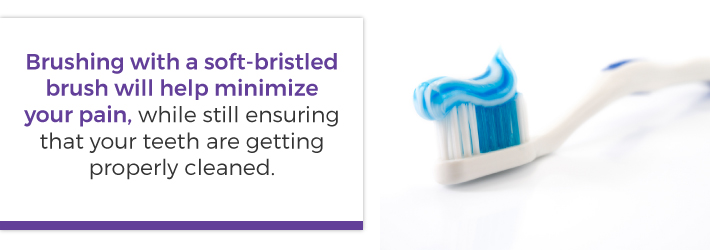 How to Eat for Optimum Oral Health for You and Your Baby During Pregnancy
How to Eat for Optimum Oral Health for You and Your Baby During Pregnancy
Your baby will be developing his or her little teeth somewhere between the third and sixth month in the womb. With this in mind, it stands to reason that you eat well for your baby’s dental health too, in addition to your own oral health.
The National Maternal and Child Oral Health Policy Center advises the following:
- Eat a variety of healthy foods, including dairy, cereals, vegetables and fruits.
- Stay away from high-sugar foods like cakes and candies, as well as limit your intake of sugary drinks.
- Snack on low-sugar foods like cheese, unsweetened yogurt, vegetables and fruits
- Eat little and often if you have morning sickness.
- Read the labels on your food to ensure there are no secret sources of sugar hidden within.
- Drink more milk and water throughout the day, ensuring your water contains fluoride.
- Take a folic acid supplement to reduce the risk of birth defects and eat foods that are high in folates. These include green leafy vegetables, legumes, products fortified with folic acid, such as bread, cereals, tomato juice, bananas, strawberries and orange juice.
- Take prenatal vitamins as directed by your physician.
How Your Dentist Can Help
When you’re pregnant, you understandably want to do everything you can to ensure that your pregnancy is a healthy one and that your baby is given the best start in life. Working in tandem with your dentist, together you can improve on your oral habits and change any that aren’t so good. Your dentist can also offer you invaluable advice on healthy eating strategies that you can incorporate into your routine.
Oral healthcare during your pregnancy is safe when recommendations are followed, and it can prevent you from transferring any potentially harmful bacteria to your unborn child.
Your dentist can:
- Conduct a full oral health assessment at your initial prenatal visit.
- Reassure you that all procedures they recommend are safe.
- Inform you of any conditions that need to be immediately treated.
- Inform you of any operations that are better postponed until after you deliver.
- Give you advice about protecting your teeth if you’re suffering from morning sickness.
- Give you excellent advice in terms of good oral health maintenance and dental hygiene habits.
No matter your lifestyle, even if you’re not pregnant, it’s good practice to get into the habit of visiting your dentist at least twice a year, so any problems can be detected before they’ve had time to worsen.
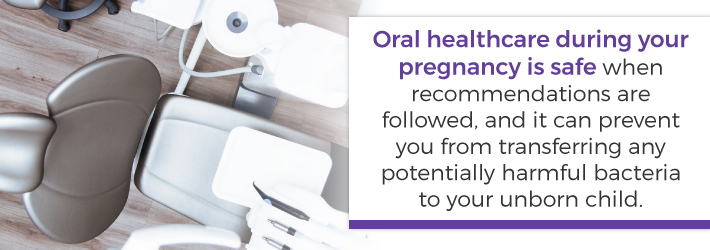 Other Tips for Good Dental Health During Pregnancy
Other Tips for Good Dental Health During Pregnancy
Now you know all about good dental health in pregnancy, it’s crucial to put this knowledge into practice. These tips will ensure you have a healthy mouth throughout the entire nine months:
- Floss daily.
- Brush with an ADA-accepted fluoride toothpaste a few times a day.
- Use products that show the ADA Seal of Acceptance.
- Attend dental appointments regularly for checkups and professional cleanings.
- Rinse your mouth out after vomiting with a baking soda or fluoride rinse to neutralize the stomach acid that could attack your teeth.
- Ensure you eat a healthy balanced diet that’s rich in vitamins and minerals, and consider taking a prenatal vitamin supplement.
- Get enough vitamin D, either via a supplement or by exposing your skin to the sun for short periods.
- Stop smoking, as babies of smokers often arrive prematurely and have low birth weights.
Most importantly, relax and take time to enjoy your pregnancy. Yes, there is a lot to do and remember, and you probably won’t feel great all the time. However, everything you do brings you one more step closer to meeting your new baby, and to ensuring that they are as healthy as can be.
After Your Baby is Born
Continue to practice good oral healthcare and eating healthy foods after your baby is born. Take care of and inspect your baby’s gums, and bring your baby to the dentist within six months after the first tooth erupts or at least by the age of one. Your baby’s primary teeth will begin growing around the age of six months.
Payson Dental office for an exam if you’re currently planning to get pregnant, or are pregnant already. We pride ourselves on our first class oral care for pregnant women, and are looking forward to meeting you and your family.
Related Resources:
How to Get Your Toddler to Brush Their Teeth
Pediatric Dental Services
Importance of Preventative Dental Care
